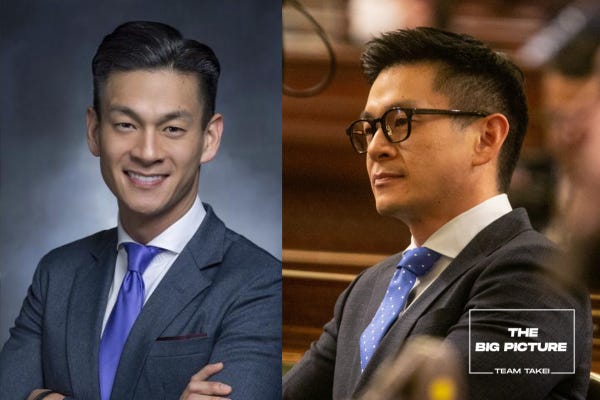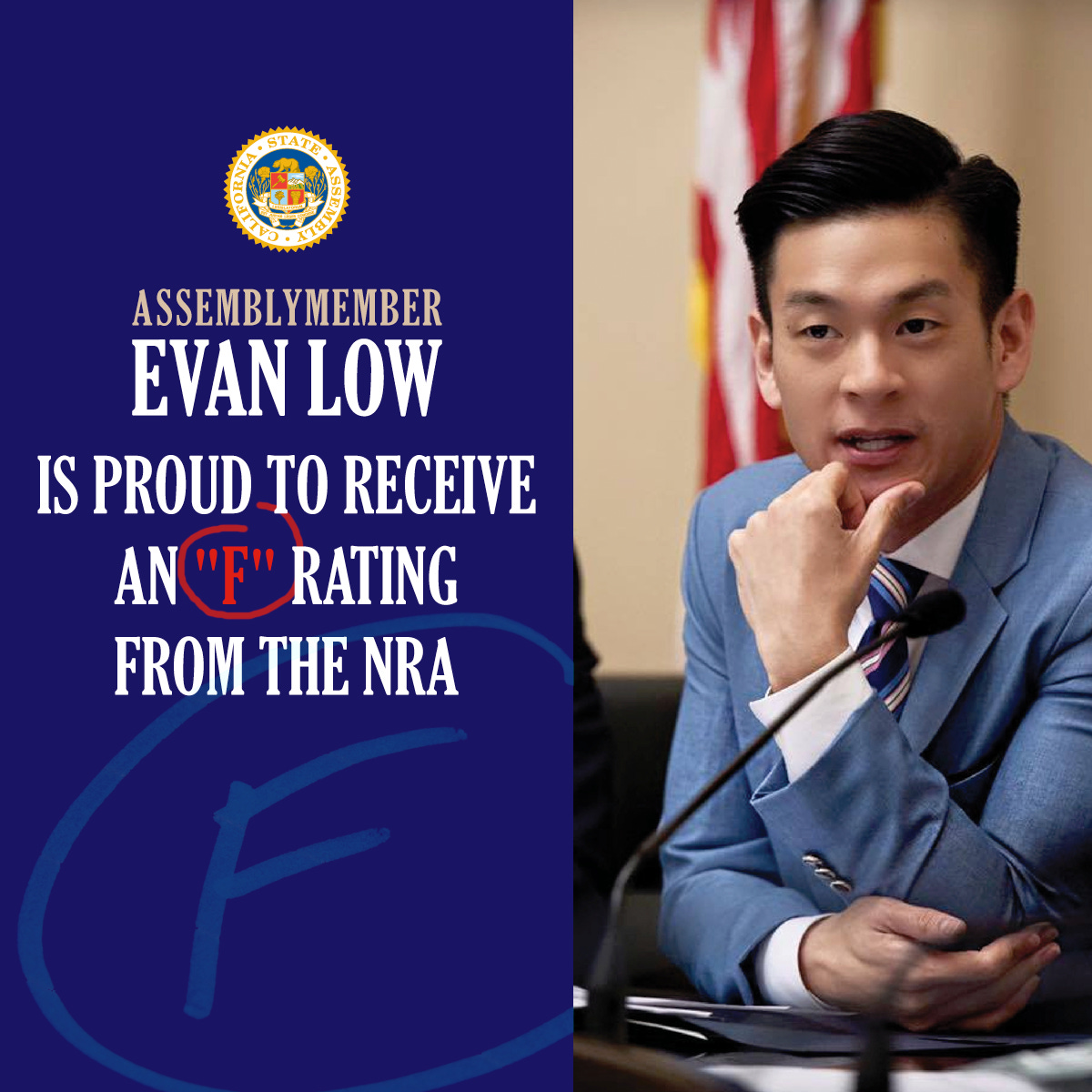The Big Q&A With California Assemblymember Evan Low
California Democratic Assemblymember Evan Low answers questions from George and Team Takei.

The Big Q&A is a series of The Big Picture where we sit down with some of the most important voices of our times to ask them the big picture questions.
Today’s interview is with former mayor of Campbell, California and current member of the California State Assembly Evan Low who—like myself—was born and raised in California.
In 2006 at the age of 23, Low was elected to serve on the Campbell City Council. In 2010, Low began serving as the youngest openly gay, Asian American mayor in the nation after being appointed by his city council colleagues.
He left this position in December 2014 to begin his first term in the California State Assembly serving the 26th district.
In 2016, New York Magazine identified Low as a potential future United States presidential candidate and in the 2017-2018 session, The Sacramento Bee recognized Low as California's most prolific lawmaker with the most bills signed by the governor.
In 2016, Low shared he received "An 'F' grade that my Chinese parents are proud of! Thanks to the National Rifle Association."
Low has maintained that "F" rating by supporting common sense gun safety and gun control measures.
As a respected, effective legislator, Low is now taking action to stop the troubling spike in hate crimes since 2016.
This is a not-to-be-missed interview with an up-and-coming Democrat with a bright future. As such, we've decided to share this Q&A with all of our subscribers without our normal guest post paywall.
We hope you share it far and wide.
— George Takei and Team
1) Tell us about your proposed bill in California and what it would do to enhance hate crime protections.
Recently in Santa Clara County, there was a case where an individual purposely targeted Southeast Asian women who wore traditional sarees. He targeted them repeatedly for violent robberies.
That sure feels like a hate crime. But current law makes it hard to hold him accountable for anything except for traditional robbery, with no enhancement for racially biased targeting.
My proposed amendment to the current law will allow prosecutors to introduce evidence relating to biases against protected groups. It’s called Assembly Bill 1064, and it will help protect victims of hate crimes.
We need this because the current law is weak. It only allows for prosecuting criminals who clearly announce their intent to target an individual by race.
But honestly, that’s pretty rare. More often, the targeting is based on racial bias that isn’t announced, even if it’s apparent.
2) Why do you feel the bill is necessary?
Are there particular groups who would be most impacted by its additional protections?
From 2020 to 2021, Asian hate crime in California jumped a staggering 177%. These attacks are not only harmful to the AAPI community, but they create an environment in which people think this is OK.
Hate is never OK. California should be at the forefront of our nation when it comes to protecting our citizens from hate crimes.
Members of our minority communities are living in fear because they have been or know someone who was targeted. As the Chair of the California Asian Pacific Islander Legislative Caucus, I am proud to author AB 1064 so our communities do not have to live in fear.
By introducing this legislation, we are rolling out the welcome mat for people to fully participate in society and feel safe here in the Golden State.
3) What pushback have you received on it, and how would you answer its critics?
The California Public Defenders Association is opposing the bill.
And I’ll use their exact words here: They oppose it because “the proposed amendments regarding ‘bias motivation’ and ‘discriminatory selection’ are most worrisome and could potentially increase prison sentences dramatically for opportunistic crimes which are transformed into hate crimes by virtue of the overbroad definitions.”
But let’s be clear. This bill does not increase penalties. It simply holds people accountable for hateful and harmful actions.
If people are concerned about mass incarceration, we have the court system in place to act as a safeguard from unnecessary convictions.
The bar for the admission of evidence in the court of law is low as is. Under my bill, in some cases a jury will be able to weigh this racial bias evidence and decide whether it is indicative of a hate crime.
If a panel of a defendant’s peers determine that a hate crime was committed, the person should be held accountable. And the judge of course has the responsibility to uphold the law and ensure that the evidence is not prejudicial.
We cannot allow criminals to deliberately target people and have them face no repercussions for their hateful actions, simply out of fear of putting people in prison longer.
Hate crime is simply an enhancement upon the crime that the defendant has been accused of. This enhancement would not result in sending more people into mass incarceration if they are found not guilty of the underlying crime.
The bill would have its largest impact on misdemeanors, which make up the vast majority of hate crime prosecutions. But it’s important to note that prison enhancements and prison time are not relevant to misdemeanors.
There is also concern that this could affect minority groups, specifically Black and brown communities. This is something that was weighed and accounted for in discussions, considering the criminal justice system is already systematically biased towards people of color.
Our main challenge has been addressing the increased incarceration argument. Some have concerns with the bill and claim it does not promote safety, address the root causes of crimes, or prevent hate crimes from happening.
I understand that imprisonment is an ineffective long-term intervention for violence prevention. However, this bill is there to act as a deterrent.
If people are not charged with hate crimes, how can they ever be held accountable for hateful actions? Will our community members feel safe?
We also understand the communities’ push for resources that lift people out of poverty to help end systemic challenges. And as a state legislator, I am exploring ways to help do this.
4) It’s AANHPI Heritage month.
What feedback have you gotten from the community on your proposed bill?
My district includes a large number of Asian American residents. I am an Asian American lawmaker. And we have seen such a massive increase in xenophobic and racist attacks in the place we call home.
It should not matter what month it is when it comes to holding people accountable for hate crimes. We need to make sure all of our communities feel safe and secure in their home, all the time.
I think of my family and ask myself how I would feel if they were attacked and the attacker was able to walk away free, despite several other people being targeted and attacked.
Our community has been calling for action and help when it comes to holding people accountable. Our community has been calling for action and help so they can feel safe walking down the street, when they go shopping, or even inside of their own home.
There has been significant loss of life in the AAPI community in California recently, and my heart breaks for all of the families involved.
When community members told me about the Monterey Park shooting and the Half Moon Bay shooting, I could feel and hear hurt in their voices. When California Governor Gavin Newsom spoke following the Half Moon Bay mass shooting, you could hear the frustration in his voice, too.
We always hope this never happens again. However, for it never to happen again, we need to act. Now is the time to act.
It is time to call hate what it is and kick it to the curb. Our community understands this. Hate is never welcome, and it certainly is not going to be welcomed here in California.
5) What are its chances of passage, and do you see other states following suit if it does?
I am confident my fellow lawmakers will support my proposed legislation and that it will pass, as is, with bipartisan support.
I encourage other state lawmakers to consider following suit and proposing similar legislation. This bill not only benefits the AAPI community, but also can have such a profound impact on all minority groups.
6) What has the process of moving this bill forward been like?
Moving a bill forward is always challenging, but you have to make sure all of the key stakeholders and voices are heard to ensure it is the right thing to do and people are being helped.
7) What has it been like representing your community in the legislature generally?
Any advice for young people looking to get involved in government as elected officials?
I have represented Silicon Valley residents in the California State Assembly since 2014. Previously, I made history in 2010 as the youngest openly LGBTQ+ mayor in the country.
During my time as an elected official, I have authored numerous laws that have increased government transparency, advanced equality, reformed the criminal justice system, helped small businesses, and encouraged job growth.
As a public servant, I am proud of my accomplishments and hope it inspires our youth to get involved, even outside of the political landscape. You do not need to be an elected official if you want to make change.
To our young people, be authentic to yourself and others. Find your passion.
There are going to be people who want to push you down because you are different, but never let it stop you.
Be you.
To learn more about Assemblymember Evan Low, you can see his latest legislative activities here.





Interesting that you post this the same day that Katelyn Jetelina posted her own article about the long-term impacts of mass shootings. Perhaps this information could be passed on to Assemblymember Low, to help maintain his laudable F rating from the NRA.
https://yourlocalepidemiologist.substack.com/p/mass-shootings-cascading-impact
Interesting information George about an interesting man who is doing everything he can to make life easier for his constituents!! I applaud him! There are close to 500 bills to be passed or already law in some states ( repugnant's states ) against the LGBTQ + communities, POC, women's rights that are basically hate bills l I don't understand why the " we the people " put up with this crap ! Do they not understand it's like the 1930's !! People need to wake the fuck up and fight these people out by voting !